- Home
- Franklin W. Dixon
The Clue of the Broken Blade Page 3
The Clue of the Broken Blade Read online
Page 3
“Well, maybe we’ll get it back,” Joe said.
Chief Collig said, “It won’t hurt. We’ll also fingerprint everyone and have their prints checked by the FBI in Washington. Do you have your tape recorder with you?”
“No, sir,” Joe said, “but we can rush home and get it while you’re taking the fingerprints.”
En route to the house, the boys discussed whether or not to get in touch with their father.
“I’d hate to spoil his vacation,” Frank said. “Besides, what can he do?”
“You’re right,” Joe agreed.
They also decided to postpone their trip to the Coast until they found out the results of the police dragnet for the bank robbers. While Joe was getting the tape recorder, Frank called the airport and canceled their flight reservations.
When the boys got back to the bank, the police had finished fingerprinting all employees. Frank and Joe asked everyone to speak into the microphone of the tape recorder, saying the words: it, me, you, the, on, I, is, and, a, and to. These were the ten standard sounds used in making voiceprints.
When they had finished taping the last voice, Frank suddenly had an idea. He turned to the bank’s vice-president. “Mr. Dollinger, didn’t you say you were using your dictaphone when the bandit stepped from your office closet?”
“That’s right.”
“Was the dictaphone still on when he spoke to you?”
Mr. Dollinger said thoughtfully, “I see what you’re getting at. Yes, it was. I switched it off before I got up from my desk, but it was on when he told me it was a stick-up.”
“Then his voice would be recorded!”
“Come on, let’s see!” Dollinger said eagerly and led the boys and Chief Collig into his private office. He set the dictaphone on playback.
After the last two sentences of the letter a guttural, obviously disguised voice broke in. “This is a stick-up. Make the wrong move and you’ve had it!’”
“Great!” Joe exclaimed.
Frank asked Dollinger to run it once more so they could record it.
“That’s just fine,” he said when he was finished. “If the stick-up man is one of your employees, we’ll find out soon!”
When Frank and Joe got home, it was lunch-time. They took a sandwich to their lab and made spectrograms of all the employees on the tape, including the one on the dictaphone.
The latter matched the voiceprint of the visiting Swiss, Signor Zonko! Obviously the man’s Italian accent had been assumed, because the voice on the dictaphone was American.
“How do you like that for nerve?” Frank said in amazement. “He helped rob the bank, then took off his mask and walked right back in. No doubt he was the heavy-set member of the gang that Dollinger described.”
Frank phoned Collig to report their discovery. The chief thanked him and said he would call back as soon as Signor Zonko was under arrest.
The phone rang an hour later. Frank answered.
“Zonko didn’t return to the bank after lunch,” Chief Collig reported. “We raided his apartment, but it was empty and all his belongings gone!”
“Oh brother!” Frank said. “As soon as we mentioned voiceprints, he must have known the jig was up.”
“Right. And here’s another piece of news. I telephoned the president of the Ticino Bank in Bellinzona. They were closed, because it’s nine o’clock at night there now, but the operator got him at home. There’s a bank officer there named Zonko, but he never left Switzerland. Our Zonko’s credentials were faked.”
“Looks as if we’re dealing with international criminals,” Frank said. “Since the only real evidence we have against them is the fake Zonko’s voiceprint, I think we’ll put it and the other spectrograms in Dad’s safe-deposit box at the bank.”
“Good idea,” Collig replied. “You’d better hide that sound spectrograph somewhere, too. After failing to steal one in Somerville, the gang may try for yours!”
“I hadn’t thought of that,” Frank said. “Thanks for the suggestion.”
When Frank hung up, he and Joe carried the spectrograph into the master bedroom and hid it behind a secret panel in their father’s closet. Then they drove down to the bank and put the tape and voiceprints they had made that day into Fenton Hardy’s safe-deposit box.
Next morning, after breakfast, the boys went to the lab to get some notes they had left there. When Joe opened the door, he stopped dead in his tracks and gaped.
The place had been torn apart. Every cabinet door stood open, the locks broken, and papers were strewn all about!
CHAPTER V
Gang War
“GOOD night!” Frank exclaimed. “And we never heard a thing!”
Joe shook his head. “I’m glad we didn’t leave that tape and the voiceprints here.”
“The spectrograph, too,” Frank added. “Whoever did this obviously never thought of looking in the house for it.”
“Well, let’s clean up the mess,” Joe said. “And then we’d better check on a flight to California!”
When the boys finished putting the laboratory back in order, Frank phoned Chief Collig, who had no news, then called the airport and made reservations for the ten-o’clock flight the next morning. He had just hung up when a well-dressed young man looked in the door.
“Hi, Scoop,” Frank said. “Come on in.”
Cub reporter Scoop Scales of the Bayport 35 Times entered the living room. “My editor sent me over to do a feature story on you guys,” he said.
“On us?” Joe said in surprise. “What for?”
“You’re too modest,” Scoop replied with a smile. “The way you two identified that fake Swiss at the Bayport Bank and Trust Company as one of the robbers deserves a special story.”
“Look, Scoop,” Frank began, “we’re not too keen on any publicity. We don’t want the whole world to know what we’re doing!”
“Don’t worry, I’ll keep it general enough. No trade secrets. Just the regular stuff, you know. Whether you like baseball and chocolate shakes, et cetera.”
Frank sighed. “All right. Go ahead if you must.”
The boys answered questions about their recent activities, including their attendance at the Voiceprint Lab, but said nothing about their impending trip. Scoop told them he would like to have a newspaper photographer take a picture of the Hardys’ house the next day.
“Aunt Gertrude will be here,” Frank said. “Just contact her.”
The following morning Callie Shaw came by in her car to drive the boys to the airport. Slender, blond Callie was Frank’s steady date. With her was Iola Morton, Chet’s dark-haired sister, whom Joe regarded as his best girl. Chet did not come along because he was on duty at the fencing school.
When it was time to say good-by at the loading gate, Callie said, “You boys stay out of trouble, hear!”
“You know they never do that,” Iola remarked with a laugh. She turned to the Hardys. “Just get out of any trouble you get into!”
As the plane passed over Denver, Joe was commenting on the amazing speed of jet travel compared to the covered wagons of a hundred years ago.
Suddenly Frank interrupted him. “I just thought of a possible motive for the bank robbers going after those tapes and voiceprints!” he said excitedly.
“What?”
“Wouldn’t the criminals whose voices are recorded gladly pay to have the tapes and their spectrograms destroyed?”
After thinking it over, Joe said, “The old shakedown racket, you mean?”
“Exactly. The gang could make big-shot crooks all over the country pay through the nose for those parts of Dad’s catalog that apply to them!”
“You may have hit it,” Joe agreed.
When they landed at San Francisco they were paged over the public-address system. “Frank and Joe Hardy please come to the United Air Lines counter,” a pleasant voice said.
While the announcement was being repeated, the boys were already entering the terminal. At the reservation desk they fou
nd a message to call Aunt Gertrude immediately.
“That’s strange,” Joe commented. “I wonder what’s so urgent.”
“Let’s find out,” Frank replied, pointing to a telephone booth. The boys squeezed in and Frank called home.
Aunt Gertrude sounded panicky. “Come back immediately!” she demanded. “Someone’s going to blow up our house!” She spoke so loud that Joe could hear her too.
“What?” Frank asked incredulously. “Who’s going to blow up the house?”
“I don’t know. A man called a little while ago. What should I do, Frank?”
“Did you call Chief Collig?”
“N-no. Didn’t think of it. All I could think of was getting in touch with you!”
“All right. Call him immediately. We’ll be at the Occidental Hotel. Phone us there. There’s nothing we can do for you from here, but the chief can give you police protection. Okay?”
“Yes,” Aunt Gertrude said weakly. “I’ll do it right away.”
Frank hung up. “Trouble,” he muttered glumly.
“Who’s going to blow up the house?”
Frank asked
Joe nodded. “Let’s get to the hotel and wait for her call.”
While the boys were getting settled in their room at the Occidental, Joe had an idea. “I’ll call Chet,” he said. “Maybe he can run over to our house and see what’s going on.”
Chet answered the phone. When Joe explained the situation to him, he promised to check on Aunt Gertrude right away.
A half-hour later Chet called back. Joe held the receiver so Frank could listen in.
Chet was laughing so hard he could hardly get out what he wanted to say. Between guffaws he wheezed, “Aunt Gertrude—the paper—she misunderstood—”
Joe said to Frank, “I take it she isn’t in any danger.” Then he spoke into the mouthpiece. “This is probably costing you about a dollar a minute, Chet!”
This instantly sobered their pal. “It was Scoop Scales,” Chet said. “He phoned your aunt because he wanted to take a picture of your house for the feature he’s writing. When he said he was going to shoot the place and blow it up, she panicked and hung up on him. He meant blow up the negative into an enlargement!”
Relieved that Aunt Gertrude was not in any danger, Frank and Joe could not help laughing, too.
“Thanks, Chet.” Toe chuckled.
“That’s only one of the things I called about,” Chet went on. “My father says he’ll pay my fare out there if you need me.”
“Why should we need you?” Joe asked.
“Aw, come on,” Chet said. “I have him all talked into it. Tony, Phil, and Biff will handle the fencing school without me. You need my help, don’t you?”
“All right,” Joe said, relenting. “I guess we could use you.”
“I’ll be in tomorrow on the same flight you took. Meet me at the airport.”
“We’ll be there,” Joe told him.
Since they would have to drive to Stockton, which was eighty-three miles from San Francisco via the freeway, the boys decided to rent a car. They got a new Ford sedan and drove to police headquarters to check in as visiting detectives.
When the officer on duty at the information desk learned they were the sons of the famous Fenton Hardy, he took them to see Chief of Detectives Henry Copeland.
Copeland was a muscular, ruddy-faced man. He greeted the boys cordially and inquired about their father, whom he knew well. Frank told him Mr. Hardy was in fine health and was presently on vacation at the Grand Canyon. Then he explained their reason for being in California.
“You may have trouble locating this Miguel Jimenez if he lives on a houseboat,” Copeland said thoughtfully. “Do you know anything about the delta region?”
Both boys shook their heads.
“It’s a triangular area of about five hundred square miles between Stockton, Sacramento, and Antioch. Once it was all under water, but many years ago it was partially drained, leaving hundreds of small islands surrounded by about a thousand miles of waterways.”
“Good grief!” Joe said. “We’ll never find him.”
“The thing is,” Copeland went on, “if he’s a recluse, he might not be listed at the Stockton Post Office.”
Frank looked glum. “It would take us a year to search all the waterways.”
“Try the mailman,” Copeland suggested.
During the conversation the boys mentioned that they had recently attended the Voiceprint Laboratories school in New Jersey. Copeland was greatly interested, since the San Francisco Police Department had just acquired a sound spectrograph.
They discussed voiceprint technology for a while, then Frank and Joe thanked the detective for his advice and left.
When Chet Morton arrived by jet the next afternoon, he brought with him a cablegram addressed to the Hardy boys from Bellinzona, Switzerland. It read:OLD BOOK IN LIBRARY HERE HAS PHOTO TIP END OF ADALANTE WITH ADAL ON IT. GUARD END SHOULD HAVE ANTE. HAVE NOT LET COUSIN KNOW I AM HERE BECAUSE FEAR FOUL PLAY. CABLE ME HOTEL ANGELO IF YOU FIND GUARD.
ETTORE RUSSO
“Any news, so far?” Chet asked his friends.
“None, except that we might have trouble locating our man.”
“Well,” Chet said breezily, “you didn’t expect this job to be easy, did you?”
When they got back to the Occidental Hotel, a uniformed policeman was waiting for the Hardys in the lobby. He said he had been sent by Chief of Detectives Henry Copeland.
“What’s up?” Joe asked.
“Our voiceprint identification expert is in the hospital with a broken leg,” the officer said. “The boss wants you to look at the spectrogram of a suspected extortionist.”
He drove the three boys to headquarters in a squad car. The Hardys introduced Chet to the detective chief, then were led to the crime lab. It took Frank and Joe only a few minutes to decide that the voice of the extortionist was not that of the suspect who had been arrested.
“Well, that leaves the case still open,” Copeland said ruefully. “But I’m glad to be able to free an innocent man. Thanks for your help, fellows.”
The Hardys were about to leave when a call came over the “hotshot” speaker, saying: “Attention all units in vicinity of Chinatown. Gun battle between rival gangs reported across from Fat Ching’s Chinese Theater.”
“Gang war!” the chief exclaimed. “I’d better get over there.”
“May we come along?” Frank asked eagerly.
Copeland hesitated, then said, “All right, but let’s get rolling!”
He and another officer jumped into a squad car. The three boys squeezed into the back and they were on their way, with siren squealing.
Soon they reached the northeast corner of the city, where San Francisco’s famous Chinatown was located. Its narrow streets were crowded with restaurants, theaters, temples, and small shops selling everything from herbs to dried fish.
“There’s Fat Ching’s Chinese Theater,” Copeland said, pointing, as they turned into a narrow street.
At that moment a machine gun began to fire from a nearby building. Bullets blew out both front tires of the squad car!
CHAPTER VI
A Pretty Welcome
THE car slewed out of control, skidded sideways through the street for about fifty yards, and halted with a jolt when its left rear side slammed into a lamppost.
Both doors on that side popped open. All five passengers dived through them and crouched behind the car for protection.
Copeland and the policeman driver drew their guns.
The building from which the shots had come was a warehouse which looked deserted, directly across the street from Fat Ching’s Chinese Theater. Four figures ran from the warehouse.
They were too far away for the boys to make out their faces. All wore hats. One was tall and thin, one squat and muscular, the third was heavy-set and burly, and the fourth had broad shoulders and narrow hips. The latter two carried Thompson submachine guns.
/> The tall, thin man and the squat man jumped into the front seat of a black sedan parked in front of the abandoned warehouse. The burly fellow sprayed the Chinese theater across the street with another round of fire. The broad-shouldered man threw a burst of shots at the wrecked police car.
The boys and the two officers flattened themselves against the pavement as bullets ripped into the vehicle from one end to the other. Then there was the roar of a motor. Cautiously getting to their knees to peer over the hood and around both ends of the car, they saw the black sedan speeding away.
On his feet now, Detective Copeland said, “Let’s see who they were shooting at in the theater.”
Gun thrust out before him, he led the way toward the building. The driver followed, his pistol ready, too. The Hardys and Chet brought up the rear.
Squad cars with sirens screaming roared to a halt from both directions as they reached the theater. Officers armed with riot guns spilled from them. Copeland ordered the team from one car to check the warehouse and to send out an alert for the black sedan. Then he sent the other team around back of the theater to cut off the escape of anyone who might still be inside.
Ordering Frank, Joe, and Chet to stay outside, the chief and his driver went into the theater. Moments later the driver came out and motioned the boys to come in.
In the lobby Copeland was bending over the figure of a small, ferret-faced man. He was bleeding from a bullet wound in his chest.
Looking up, the chief said, “Ziggy Felton, a member of the Rocky Morgan gang. He says three of his buddies were with him, but they ran out the back way.” Glancing at the driver, Copeland said, “Go call an ambulance.”
As the policeman moved away, Copeland turned back to Felton. “What was it all about, Ziggy?”
In a weak voice the little man replied, “It’s a new mob from the East Coast. They’ve got a tape of Rocky’s voice and also his voiceprint. They wanted fifty grand, or else they were going to turn both over to the cops.”
Ziggy wheezed. “We got the word they were holed up in that warehouse across the street, and Rocky decided to hit them instead of paying off. They were too tough, though. Drove us in here, then they got me’

 The Great Pumpkin Smash
The Great Pumpkin Smash Who Let the Frogs Out?
Who Let the Frogs Out? Return to Black Bear Mountain
Return to Black Bear Mountain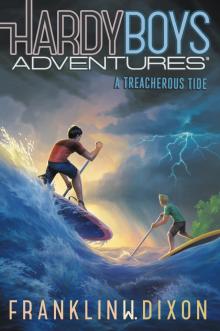 A Treacherous Tide
A Treacherous Tide Bug-Napped
Bug-Napped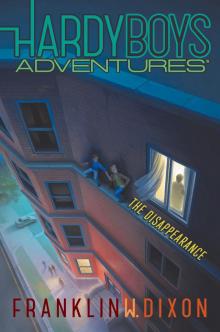 The Disappearance
The Disappearance Sea Life Secrets
Sea Life Secrets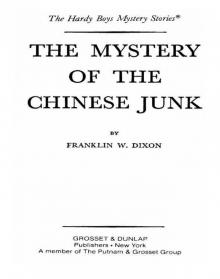 The Mystery of the Chinese Junk
The Mystery of the Chinese Junk A Skateboard Cat-astrophe
A Skateboard Cat-astrophe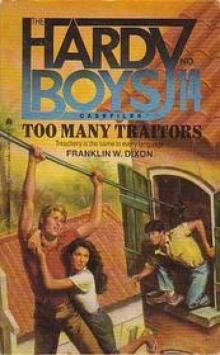 Too Many Traitors
Too Many Traitors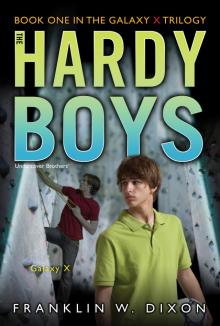 Galaxy X
Galaxy X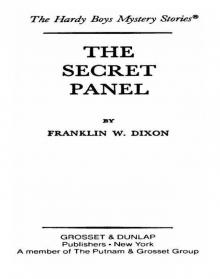 The Secret Panel
The Secret Panel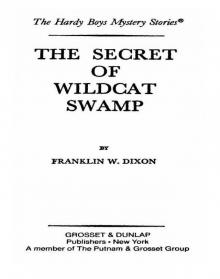 The Secret of Wildcat Swamp
The Secret of Wildcat Swamp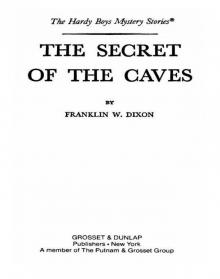 The Secret of the Caves
The Secret of the Caves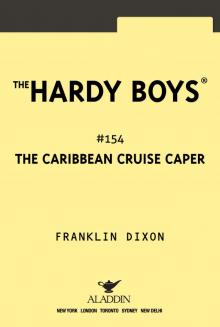 The Caribbean Cruise Caper
The Caribbean Cruise Caper Without a Trace
Without a Trace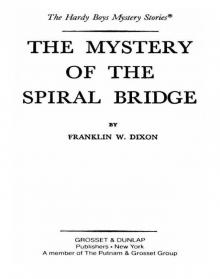 The Mystery of the Spiral Bridge
The Mystery of the Spiral Bridge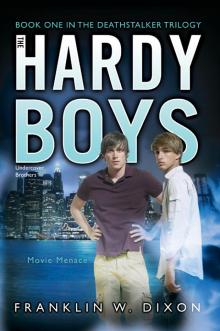 Movie Menace
Movie Menace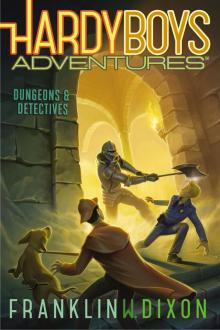 Dungeons & Detectives
Dungeons & Detectives Water-Ski Wipeout
Water-Ski Wipeout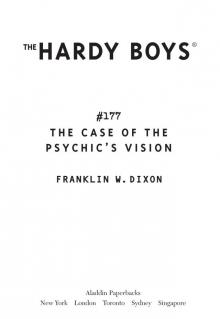 The Case of the Psychic's Vision
The Case of the Psychic's Vision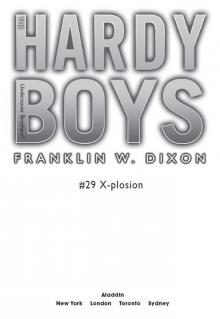 X-plosion
X-plosion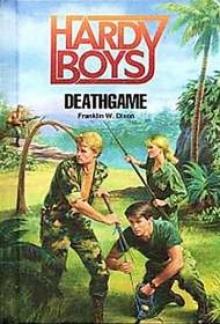 Deathgame
Deathgame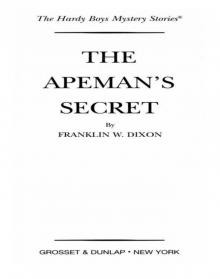 The Apeman's Secret
The Apeman's Secret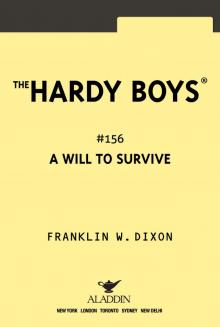 A Will to Survive
A Will to Survive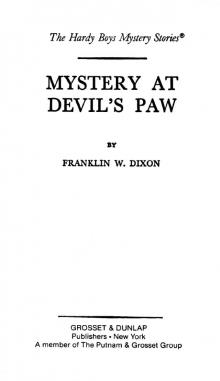 Mystery at Devil's Paw
Mystery at Devil's Paw Blood Money
Blood Money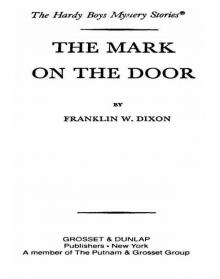 The Mark on the Door
The Mark on the Door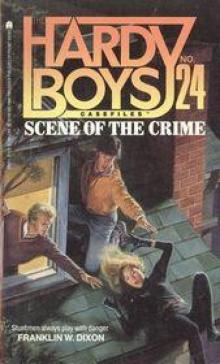 Scene of the Crime
Scene of the Crime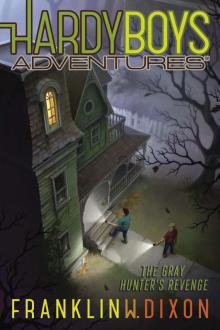 The Gray Hunter's Revenge
The Gray Hunter's Revenge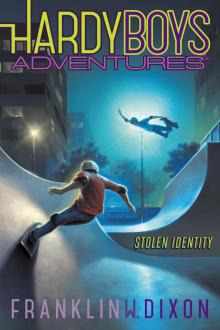 Stolen Identity
Stolen Identity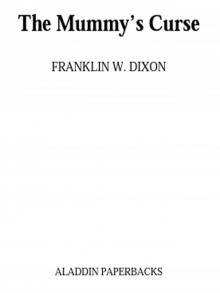 The Mummy's Curse
The Mummy's Curse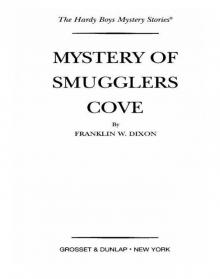 Mystery of Smugglers Cove
Mystery of Smugglers Cove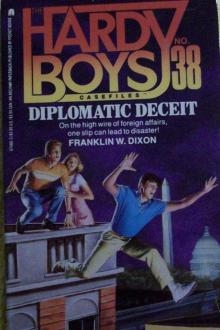 Diplomatic Deceit
Diplomatic Deceit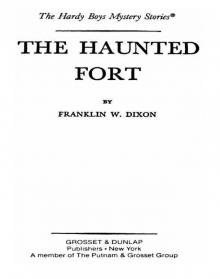 The Haunted Fort
The Haunted Fort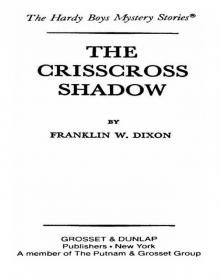 The Crisscross Shadow
The Crisscross Shadow Secret of the Red Arrow
Secret of the Red Arrow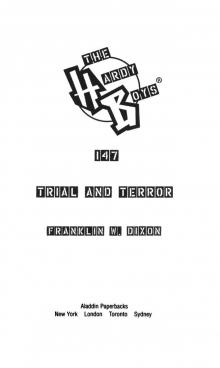 Trial and Terror
Trial and Terror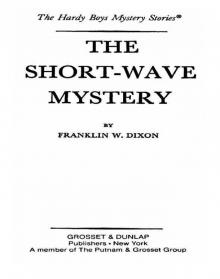 The Short-Wave Mystery
The Short-Wave Mystery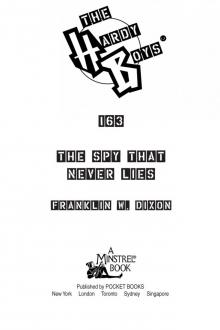 The Spy That Never Lies
The Spy That Never Lies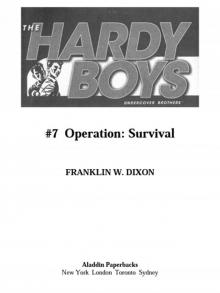 Operation: Survival
Operation: Survival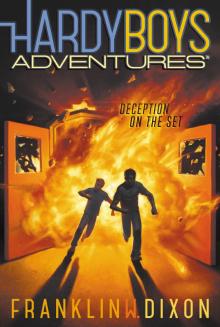 Deception on the Set
Deception on the Set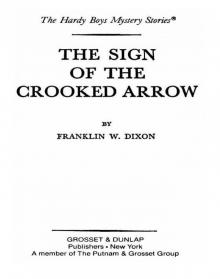 The Sign of the Crooked Arrow
The Sign of the Crooked Arrow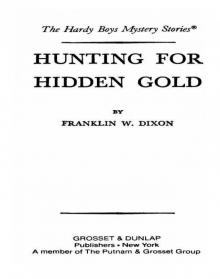 Hunting for Hidden Gold
Hunting for Hidden Gold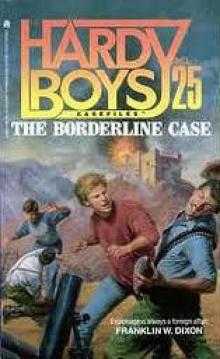 Disaster for Hire
Disaster for Hire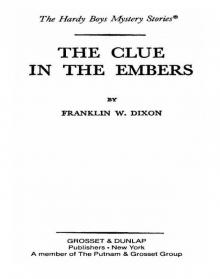 The Clue in the Embers
The Clue in the Embers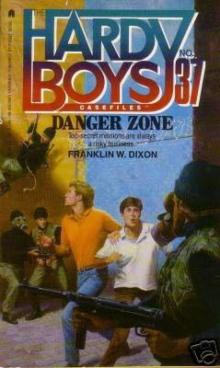 Danger Zone
Danger Zone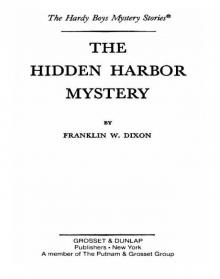 The Hidden Harbor Mystery
The Hidden Harbor Mystery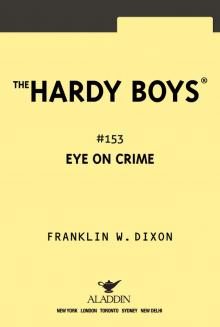 Eye on Crime
Eye on Crime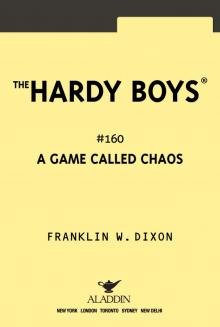 A Game Called Chaos
A Game Called Chaos The Bicycle Thief
The Bicycle Thief The Missing Playbook
The Missing Playbook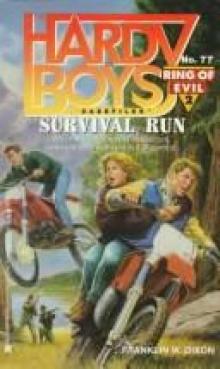 Survival Run
Survival Run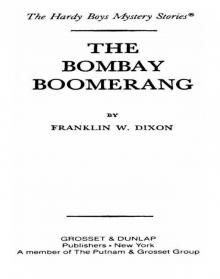 The Bombay Boomerang
The Bombay Boomerang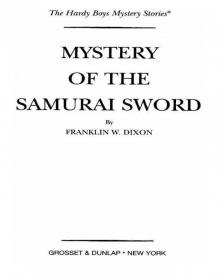 Mystery of the Samurai Sword
Mystery of the Samurai Sword Burned
Burned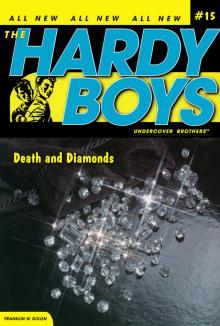 Death and Diamonds
Death and Diamonds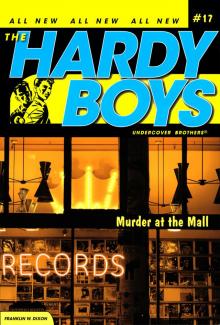 Murder at the Mall
Murder at the Mall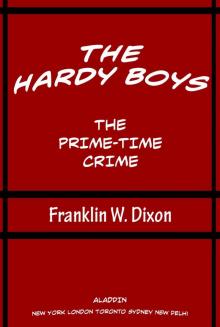 The Prime-Time Crime
The Prime-Time Crime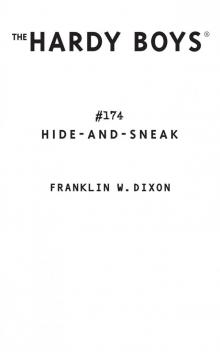 Hide-and-Sneak
Hide-and-Sneak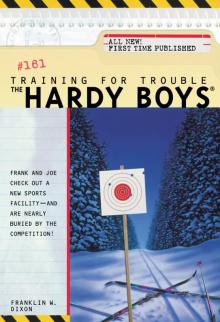 Training for Trouble
Training for Trouble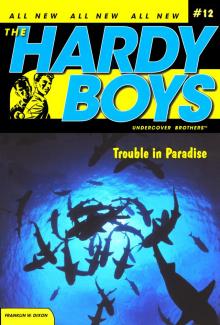 Trouble in Paradise
Trouble in Paradise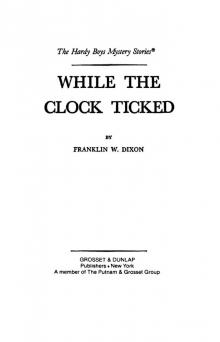 While the Clock Ticked
While the Clock Ticked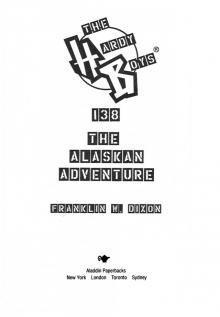 The Alaskan Adventure
The Alaskan Adventure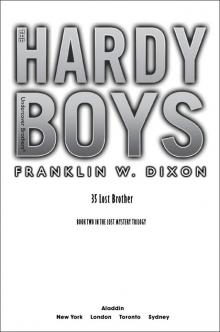 The Lost Brother
The Lost Brother Tunnel of Secrets
Tunnel of Secrets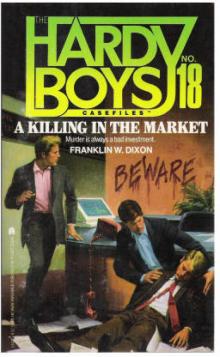 A Killing in the Market
A Killing in the Market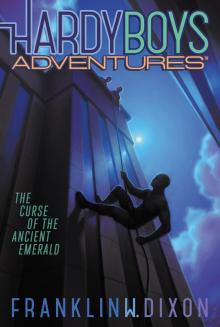 The Curse of the Ancient Emerald
The Curse of the Ancient Emerald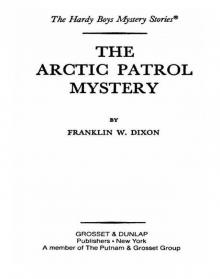 The Arctic Patrol Mystery
The Arctic Patrol Mystery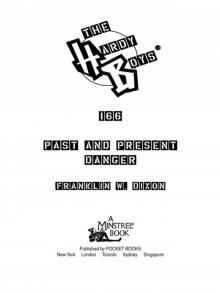 Past and Present Danger
Past and Present Danger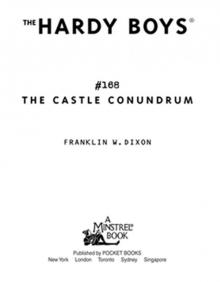 The Castle Conundrum (Hardy Boys)
The Castle Conundrum (Hardy Boys)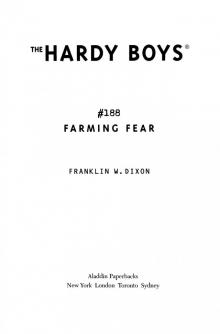 Farming Fear
Farming Fear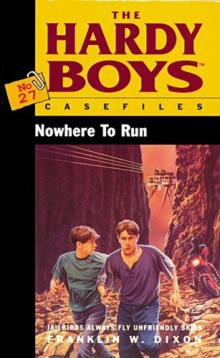 Nowhere to Run
Nowhere to Run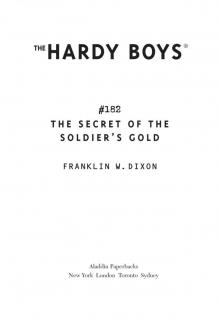 The Secret of the Soldier's Gold
The Secret of the Soldier's Gold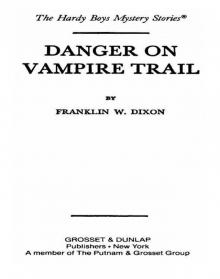 Danger on Vampire Trail
Danger on Vampire Trail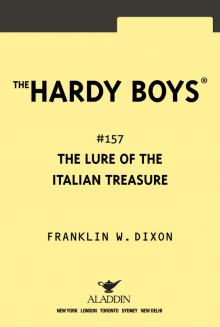 The Lure of the Italian Treasure
The Lure of the Italian Treasure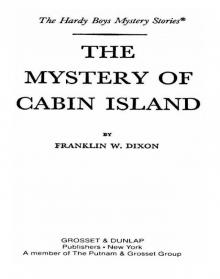 The Mystery of Cabin Island
The Mystery of Cabin Island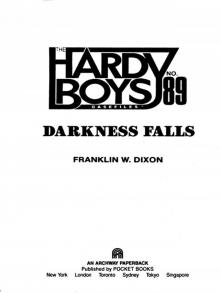 Darkness Falls
Darkness Falls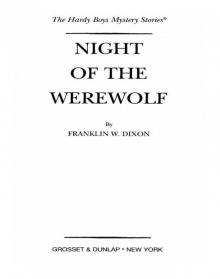 Night of the Werewolf
Night of the Werewolf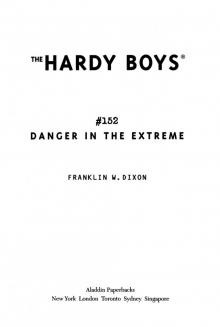 Danger in the Extreme
Danger in the Extreme The Lazarus Plot
The Lazarus Plot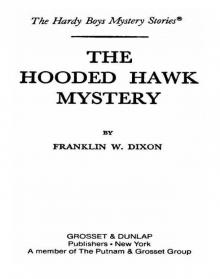 The Hooded Hawk Mystery
The Hooded Hawk Mystery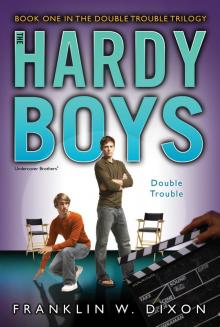 Double Trouble
Double Trouble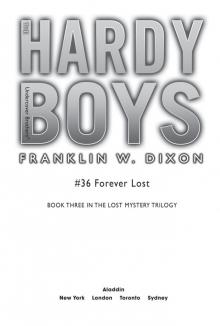 Forever Lost
Forever Lost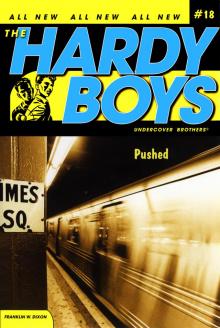 Pushed
Pushed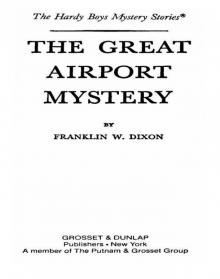 The Great Airport Mystery
The Great Airport Mystery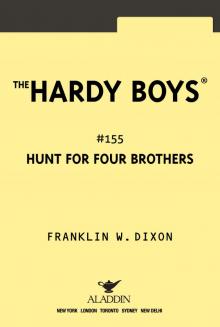 The Hunt for Four Brothers
The Hunt for Four Brothers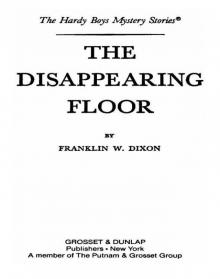 The Disappearing Floor
The Disappearing Floor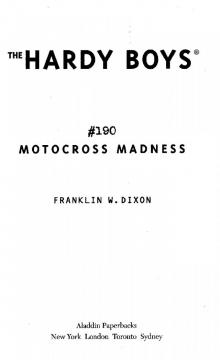 Motocross Madness
Motocross Madness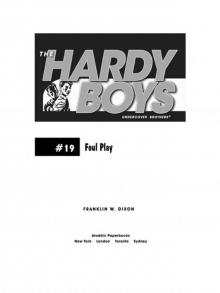 Foul Play
Foul Play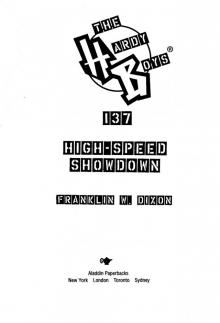 High-Speed Showdown
High-Speed Showdown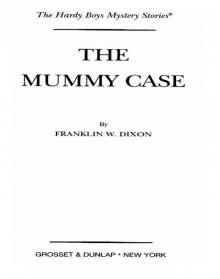 The Mummy Case
The Mummy Case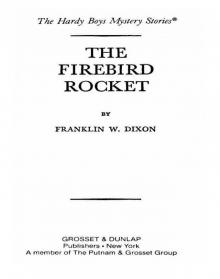 The Firebird Rocket
The Firebird Rocket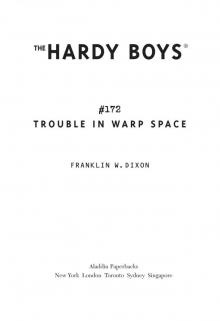 Trouble in Warp Space
Trouble in Warp Space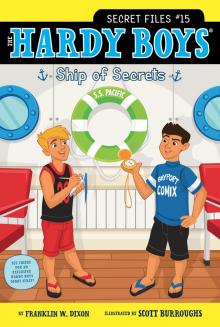 Ship of Secrets
Ship of Secrets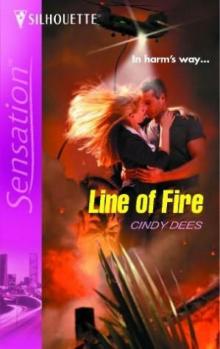 Line of Fire
Line of Fire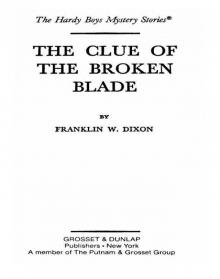 The Clue of the Broken Blade
The Clue of the Broken Blade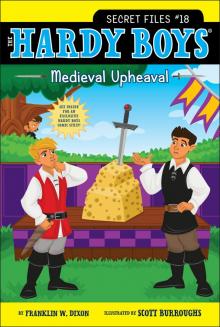 Medieval Upheaval
Medieval Upheaval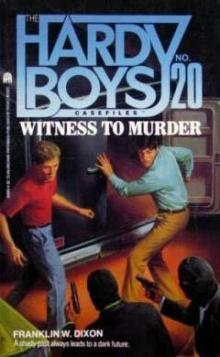 Witness to Murder
Witness to Murder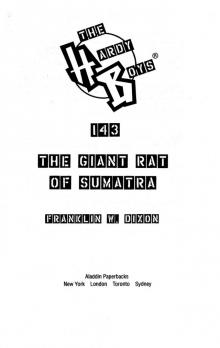 The Giant Rat of Sumatra
The Giant Rat of Sumatra Attack of the Bayport Beast
Attack of the Bayport Beast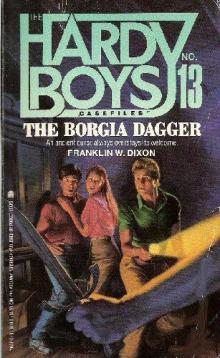 The Borgia Dagger
The Borgia Dagger Scavenger Hunt Heist
Scavenger Hunt Heist No Way Out
No Way Out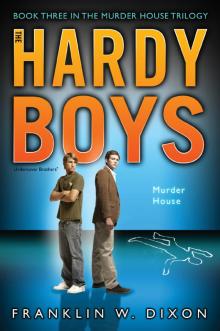 Murder House
Murder House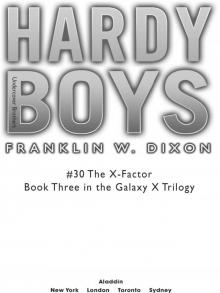 The X-Factor
The X-Factor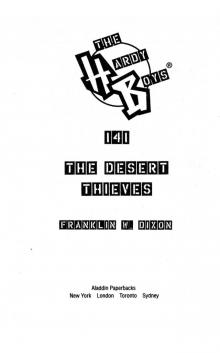 The Desert Thieves
The Desert Thieves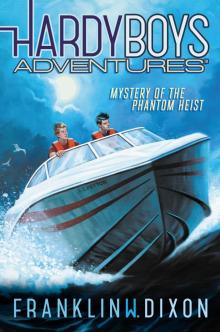 Mystery of the Phantom Heist
Mystery of the Phantom Heist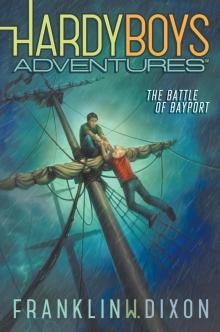 The Battle of Bayport
The Battle of Bayport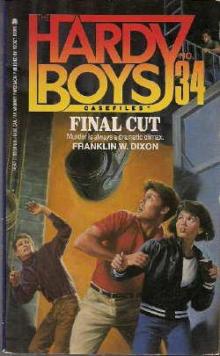 Final Cut
Final Cut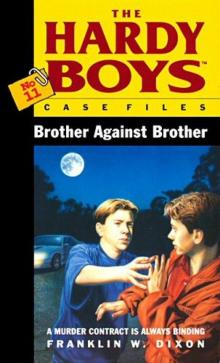 Brother Against Brother
Brother Against Brother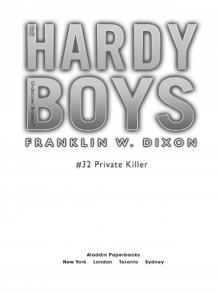 Private Killer
Private Killer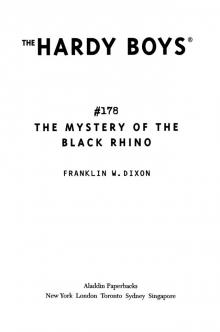 The Mystery of the Black Rhino
The Mystery of the Black Rhino Feeding Frenzy
Feeding Frenzy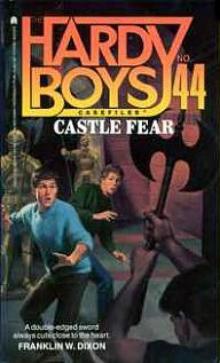 Castle Fear
Castle Fear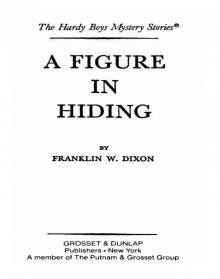 A Figure in Hiding
A Figure in Hiding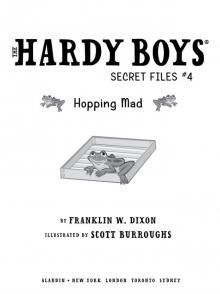 Hopping Mad
Hopping Mad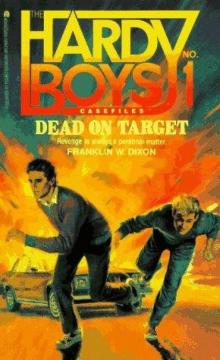 Dead on Target
Dead on Target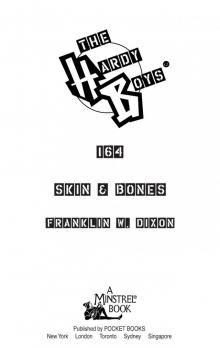 Skin and Bones
Skin and Bones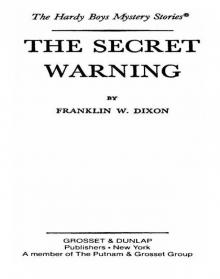 The Secret Warning
The Secret Warning Flesh and Blood
Flesh and Blood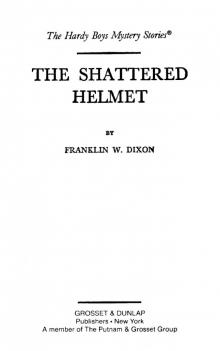 The Shattered Helmet
The Shattered Helmet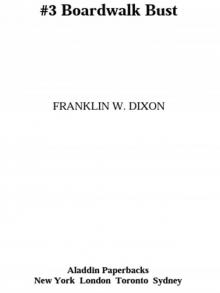 Boardwalk Bust
Boardwalk Bust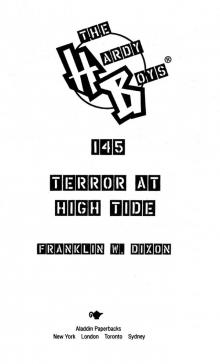 Terror at High Tide
Terror at High Tide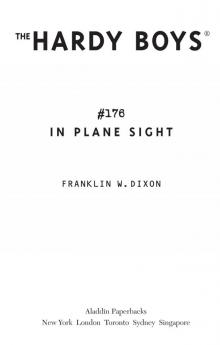 In Plane Sight
In Plane Sight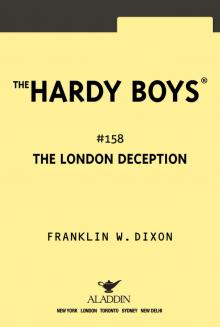 The London Deception
The London Deception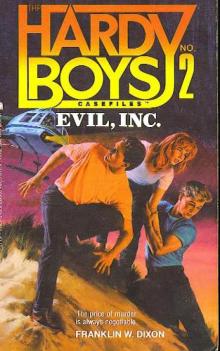 Evil, Inc.
Evil, Inc.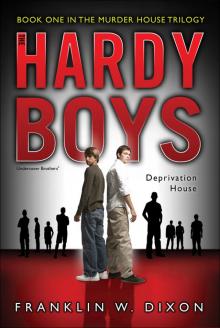 Deprivation House
Deprivation House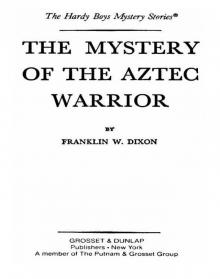 The Mystery of the Aztec Warrior
The Mystery of the Aztec Warrior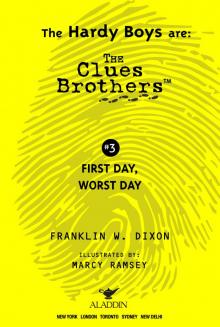 First Day, Worst Day
First Day, Worst Day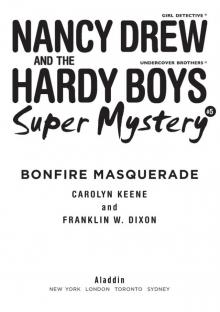 Bonfire Masquerade
Bonfire Masquerade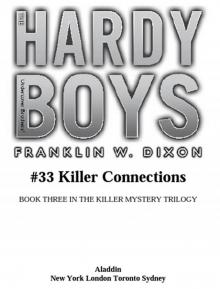 Killer Connections
Killer Connections Strategic Moves
Strategic Moves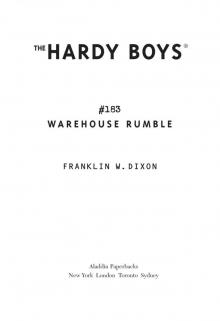 Warehouse Rumble
Warehouse Rumble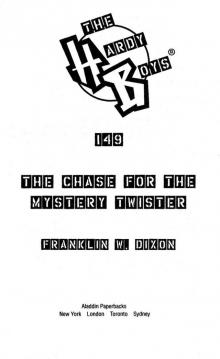 The Chase for the Mystery Twister
The Chase for the Mystery Twister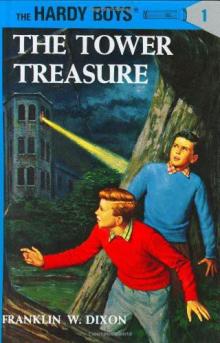 The Tower Treasure thb-1
The Tower Treasure thb-1 The Children of the Lost
The Children of the Lost The Last Laugh
The Last Laugh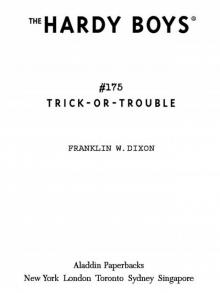 Trick-or-Trouble
Trick-or-Trouble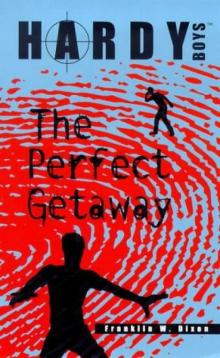 Perfect Getaway
Perfect Getaway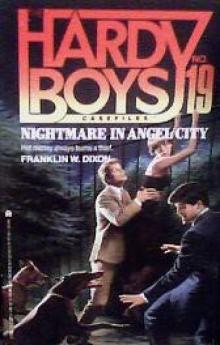 Nightmare in Angel City
Nightmare in Angel City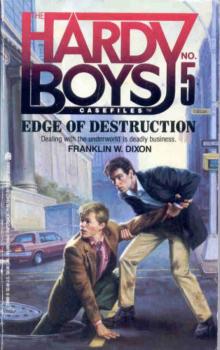 Edge of Destruction
Edge of Destruction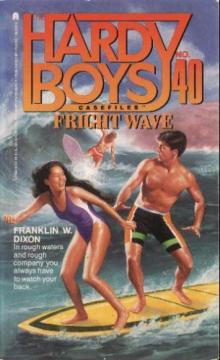 Fright Wave
Fright Wave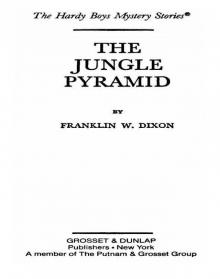 The Jungle Pyramid
The Jungle Pyramid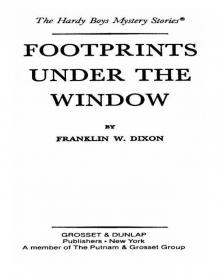 Footprints Under the Window
Footprints Under the Window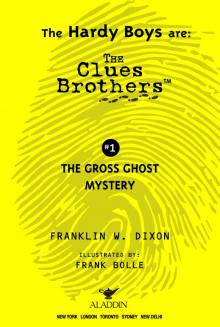 The Gross Ghost Mystery
The Gross Ghost Mystery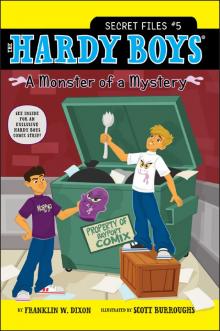 A Monster of a Mystery
A Monster of a Mystery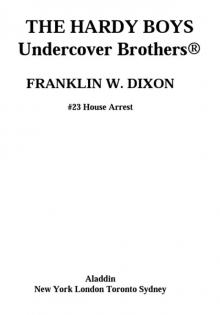 House Arrest
House Arrest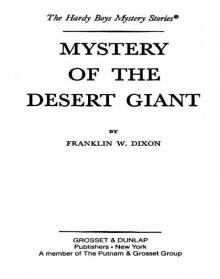 Mystery of the Desert Giant
Mystery of the Desert Giant Talent Show Tricks
Talent Show Tricks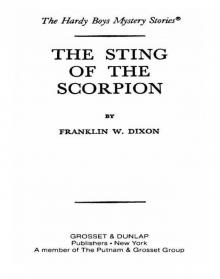 The Sting of the Scorpion
The Sting of the Scorpion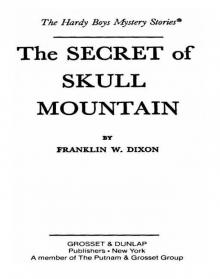 The Secret of Skull Mountain
The Secret of Skull Mountain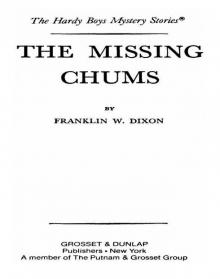 The Missing Chums
The Missing Chums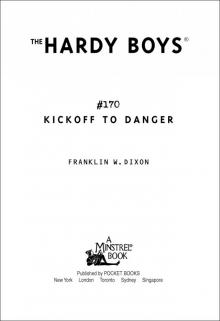 Kickoff to Danger
Kickoff to Danger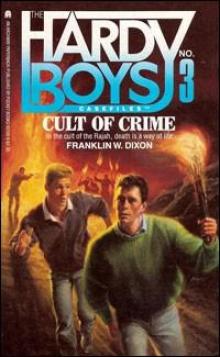 Cult of Crime
Cult of Crime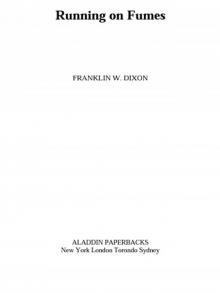 Running on Fumes
Running on Fumes Martial Law
Martial Law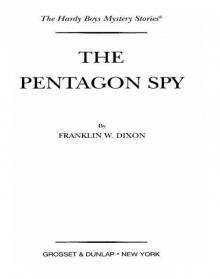 The Pentagon Spy
The Pentagon Spy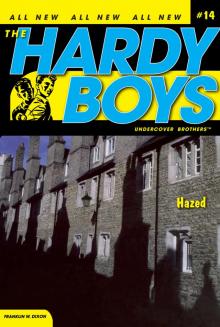 Hazed
Hazed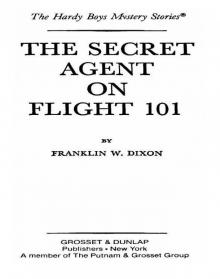 The Secret Agent on Flight 101
The Secret Agent on Flight 101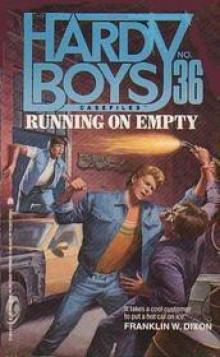 Running on Empty
Running on Empty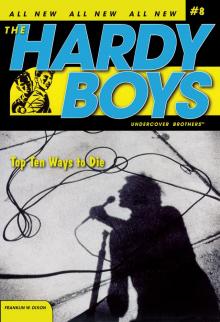 Top Ten Ways to Die
Top Ten Ways to Die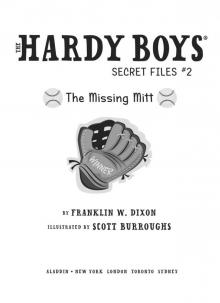 The Missing Mitt
The Missing Mitt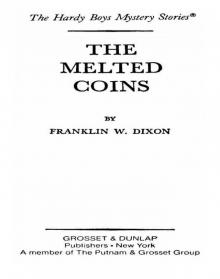 The Melted Coins
The Melted Coins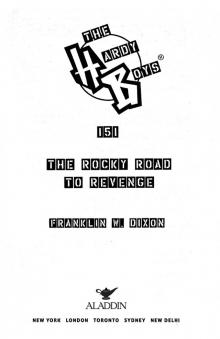 The Rocky Road to Revenge
The Rocky Road to Revenge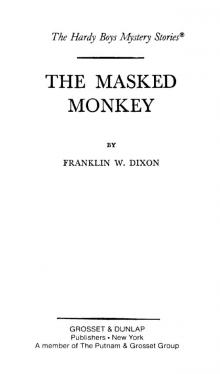 The Masked Monkey
The Masked Monkey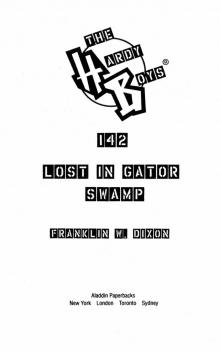 Lost in Gator Swamp
Lost in Gator Swamp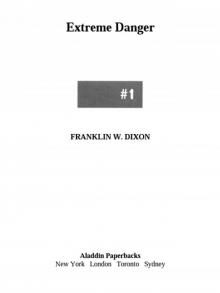 Extreme Danger
Extreme Danger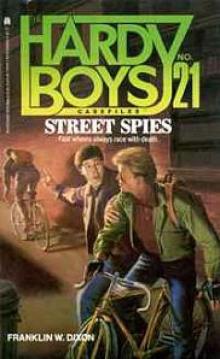 Street Spies
Street Spies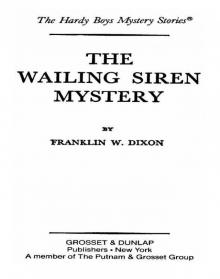 The Wailing Siren Mystery
The Wailing Siren Mystery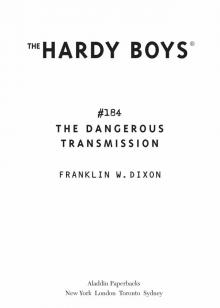 The Dangerous Transmission
The Dangerous Transmission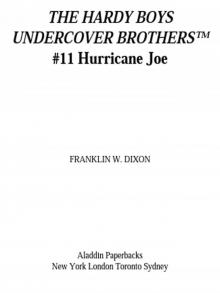 Hurricane Joe
Hurricane Joe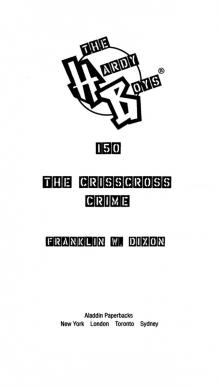 The Crisscross Crime
The Crisscross Crime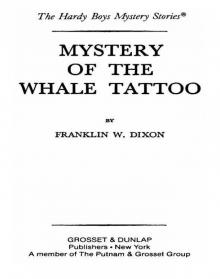 Mystery of the Whale Tattoo
Mystery of the Whale Tattoo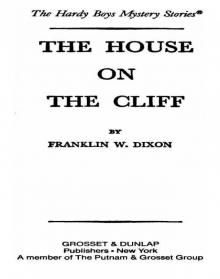 The House on the Cliff
The House on the Cliff Camping Chaos
Camping Chaos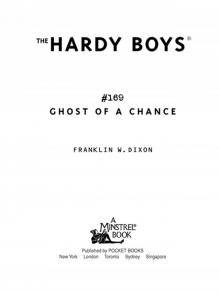 Ghost of a Chance
Ghost of a Chance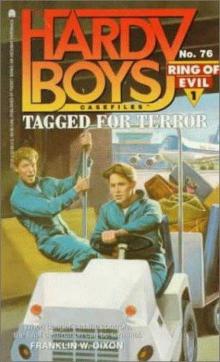 Tagged for Terror
Tagged for Terror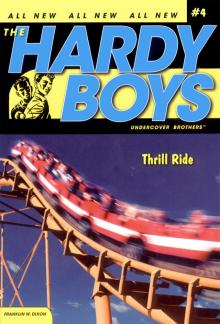 Thrill Ride
Thrill Ride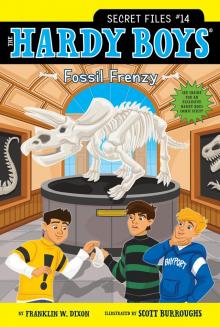 Fossil Frenzy
Fossil Frenzy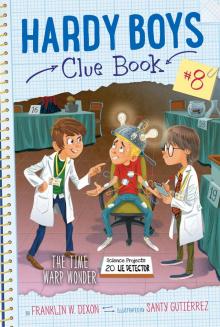 The Time Warp Wonder
The Time Warp Wonder Ghost Stories
Ghost Stories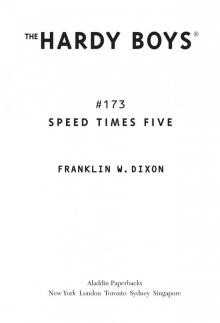 Speed Times Five
Speed Times Five What Happened at Midnight
What Happened at Midnight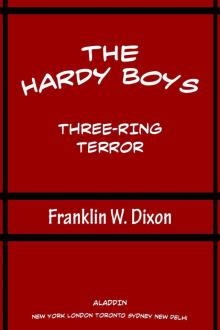 Three-Ring Terror
Three-Ring Terror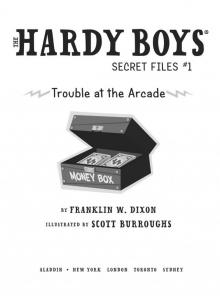 Trouble at the Arcade
Trouble at the Arcade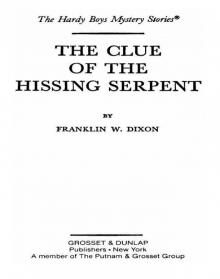 The Clue of the Hissing Serpent
The Clue of the Hissing Serpent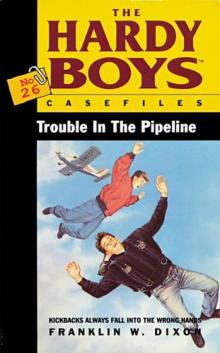 Trouble in the Pipeline
Trouble in the Pipeline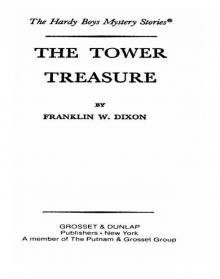 The Tower Treasure
The Tower Treasure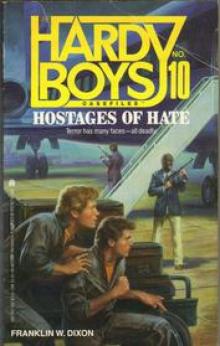 Hostages of Hate
Hostages of Hate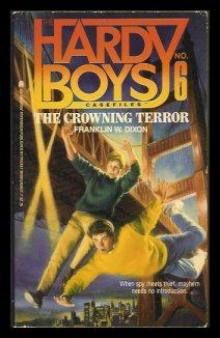 The Crowning Terror
The Crowning Terror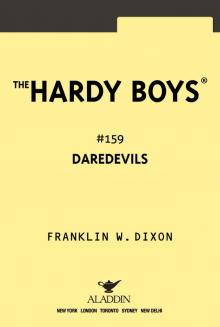 Daredevils
Daredevils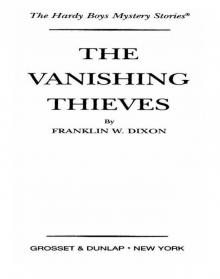 The Vanishing Thieves
The Vanishing Thieves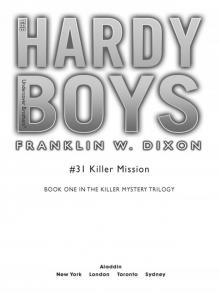 Killer Mission
Killer Mission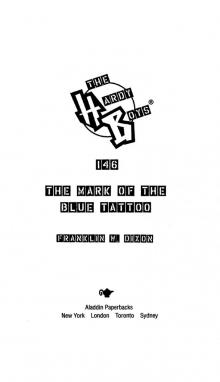 The Mark of the Blue Tattoo
The Mark of the Blue Tattoo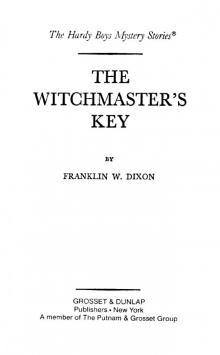 The Witchmaster's Key
The Witchmaster's Key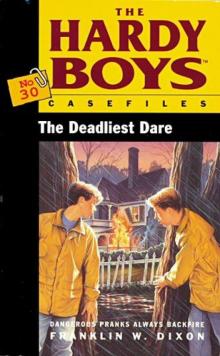 The Deadliest Dare
The Deadliest Dare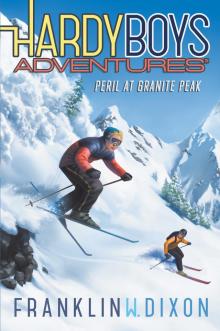 Peril at Granite Peak
Peril at Granite Peak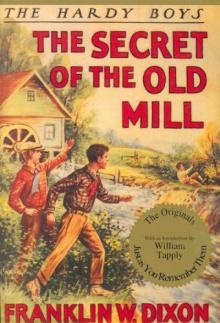 The Secret Of The Old Mill thb-3
The Secret Of The Old Mill thb-3 Rocky Road
Rocky Road The Demolition Mission
The Demolition Mission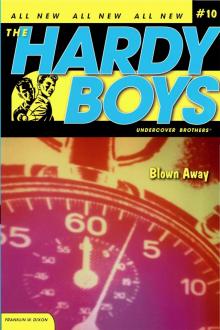 Blown Away
Blown Away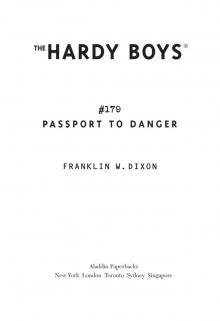 Passport to Danger
Passport to Danger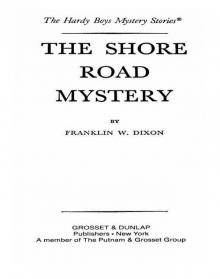 The Shore Road Mystery
The Shore Road Mystery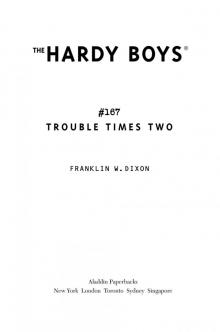 Trouble Times Two
Trouble Times Two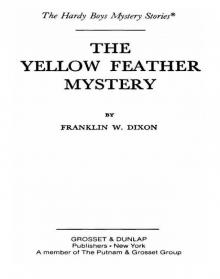 The Yellow Feather Mystery
The Yellow Feather Mystery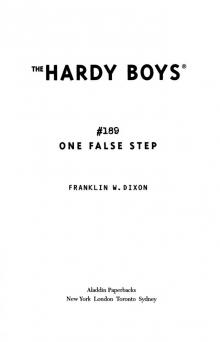 One False Step
One False Step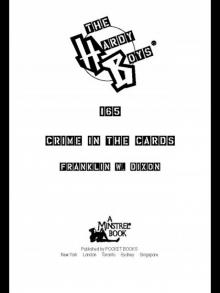 Crime in the Cards
Crime in the Cards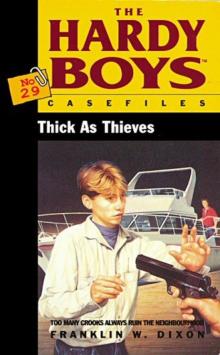 Thick as Thieves
Thick as Thieves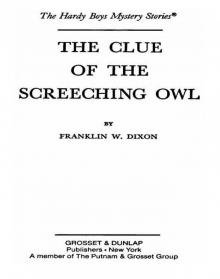 The Clue of the Screeching Owl
The Clue of the Screeching Owl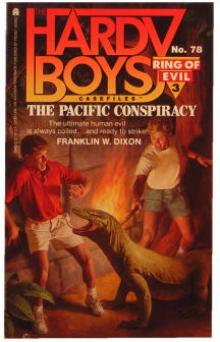 The Pacific Conspiracy
The Pacific Conspiracy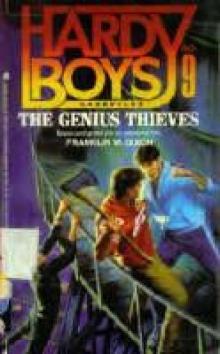 The Genius Thieves
The Genius Thieves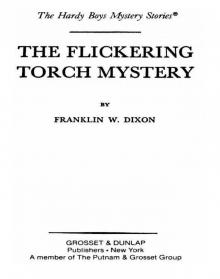 The Flickering Torch Mystery
The Flickering Torch Mystery Into Thin Air
Into Thin Air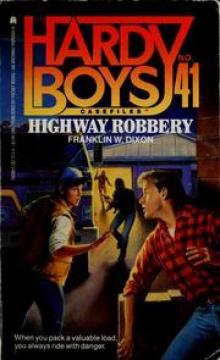 Highway Robbery
Highway Robbery Deadfall
Deadfall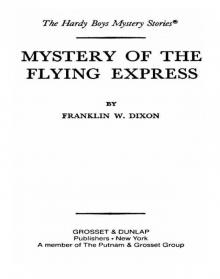 Mystery of the Flying Express
Mystery of the Flying Express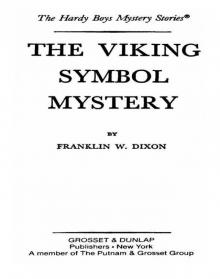 The Viking Symbol Mystery
The Viking Symbol Mystery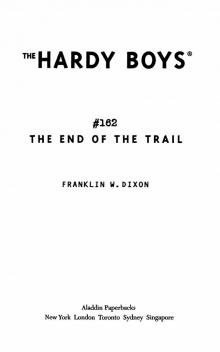 The End of the Trail
The End of the Trail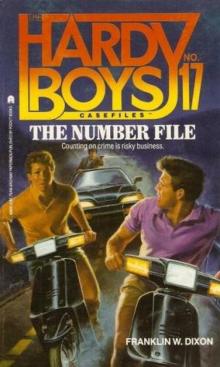 The Number File
The Number File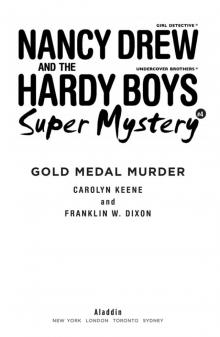 Gold Medal Murder
Gold Medal Murder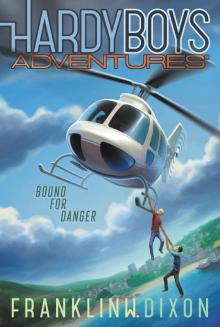 Bound for Danger
Bound for Danger Collision Course
Collision Course The Madman of Black Bear Mountain
The Madman of Black Bear Mountain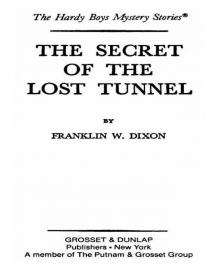 The Secret of the Lost Tunnel
The Secret of the Lost Tunnel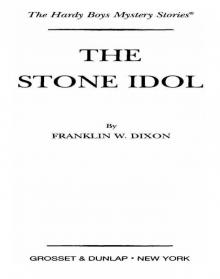 The Stone Idol
The Stone Idol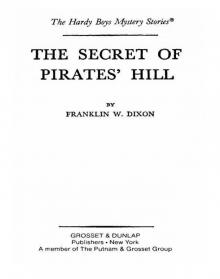 The Secret of Pirates' Hill
The Secret of Pirates' Hill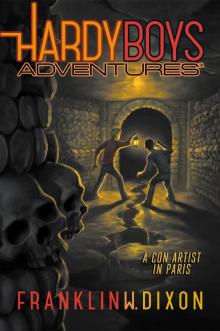 A Con Artist in Paris
A Con Artist in Paris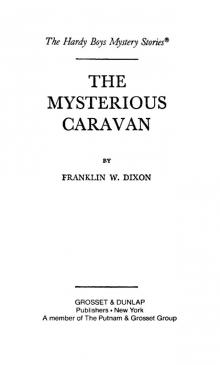 The Mysterious Caravan
The Mysterious Caravan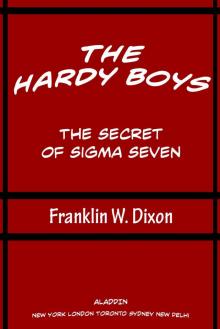 The Secret of Sigma Seven
The Secret of Sigma Seven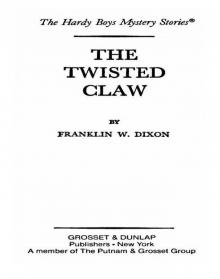 The Twisted Claw
The Twisted Claw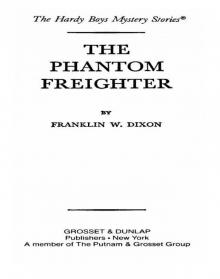 The Phantom Freighter
The Phantom Freighter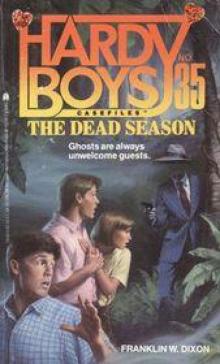 The Dead Season
The Dead Season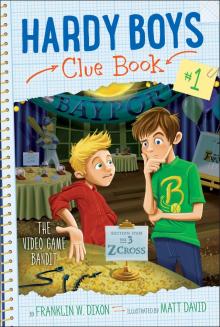 The Video Game Bandit
The Video Game Bandit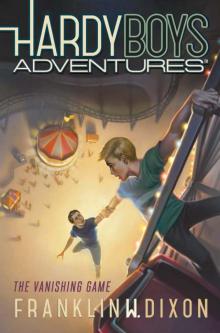 The Vanishing Game
The Vanishing Game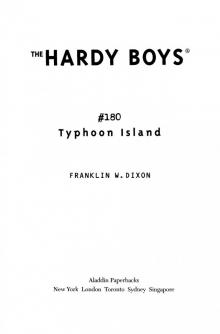 Typhoon Island
Typhoon Island